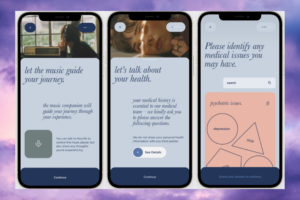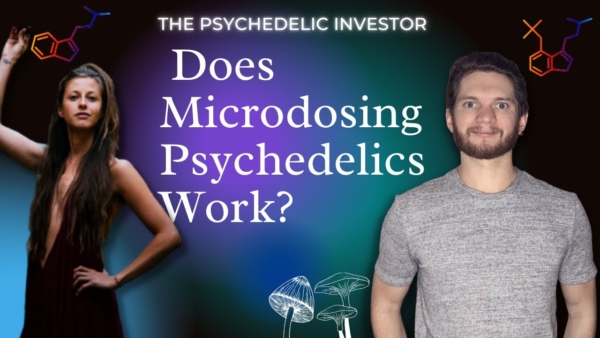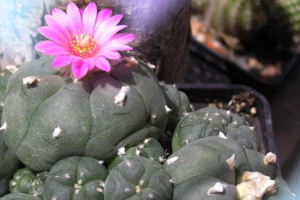
As the momentum for psychedelic-based therapies continues to build, several significant developments are making headlines this week. Colorado is taking decisive steps toward legalization by initiating public listening sessions to shape future healing centers for psychedelic therapies. In the corporate sphere, Cybin Inc. has expanded its market influence with the acquisition of Small Pharma, aiming to be a frontrunner in psychedelic-based mental health solutions. Meanwhile, new research is reinforcing the medical community’s faith in the power of psychedelics; trained therapists are found to enhance the effectiveness of ‘magic mushroom’ treatments for conditions like cancer and depression, and a recent study has shown that psilocybin offers quick and lasting emotional relief for female cancer patients. From regulatory changes to corporate acquisitions and scientific validations, let’s dive into the roundup!
Cybin Inc. Acquires Small Pharma to Lead in Psychedelic-Based Mental Health Therapies
Cybin Inc., a Toronto and New York-listed biopharmaceutical company focused on developing psychedelic-based treatments for mental health, has agreed to acquire U.K.-based biotech firm Small Pharma in an all-share deal published in a press release this week. Small Pharma shareholders will receive 0.2409 Cybin shares for each Small Pharma share they own, equating to roughly $0.10 per Small Pharma share as of August 25, 2023. This represents a 43.64% premium based on a 30-day volume weighted average. Following the transaction, existing Cybin and Small Pharma shareholders are expected to own approximately 74.5% and 25.5% of the combined company, respectively.
Both Cybin Inc. and Small Pharma’s boards have unanimously approved a merger that seeks to establish a leading entity in psychedelic-based mental health treatments. CEO Doug Drysdale of Cybin emphasized that the merger will leverage the strengths and resources of both companies, including their research and intellectual property. It also offers improved prospects for future funding without incurring debt. Small Pharma, known for raising $63 million since 2021 and making significant advancements in DMT-based therapies for Major Depressive Disorder, aims to accelerate the development of new treatments for mental health conditions by joining forces. The merger will leverage the largest systematic dataset on short-duration psychedelic molecules like DMT and deuterated DMT. Expect operational and cost efficiencies to result from this merger.
“This transaction creates a clear market leader in novel psychedelic therapeutics. The synergy of Cybin’s and Small Pharma’s development programs, intellectual property, and robust datasets enhances our leadership and expertise in developing potentially best-in-class, optimized psychedelic therapeutics, and positions the combined company to generate long-term value for all stakeholders. Our combined portfolios, having an increased number of potential value-catalysts, also create added opportunities to support future funding activities with no added debt. We look forward to welcoming our Small Pharma colleagues into the Cybin team,” said Doug Drysdale, Chief Executive Officer of Cybin.
The merger between Cybin Inc. and Small Pharma is a game-changer in the field of psychedelic drug development. With a leading intellectual property (IP) portfolio, they are poised to revolutionize mental health treatments. Together, they hold 158 pending patent applications, two approved applications, and 28 granted patents, providing a solid foundation for innovative therapies. George Tziras, CEO of Small Pharma, is thrilled about the merger, as it aligns with their mission to advance mental health. Furthermore, Cybin’s presence in U.S. capital markets opens doors to greater financial resources. These visionary companies are determined to become leaders in psychedelic-based therapies, transforming the landscape of mental health.
The Power of Connection: How Trained Therapists Supercharge ‘Magic Mushroom’ Treatments for Cancer and Depression
A recent study at the Bill Richards Center for Healing highlights the significance of having a trained therapist when utilizing “magic mushrooms” (psilocybin) as a treatment for conditions such as cancer-related stress and severe depression. These therapists play a crucial role in establishing a supportive and interconnected environment, ultimately enhancing the effectiveness of the treatment. The research delved into recordings from a trial involving patients with cancer and depression, aiming to comprehend the pivotal nature of the therapist-patient relationship within this specific form of treatment.
Out of 2,074 minutes of video footage studied, the team noted 372 instances where a meaningful connection between the therapist and patient happened. Interestingly, about 83% of these instances were spotted by at least two of the people reviewing the video, and 41% were noticed by all three. The reviewers used both sound and visual signs to make these identifications about half of the time, while they relied only on sound or only on sight 33% and 16% of the time, respectively.
Experts were hired to watch for signs that showed a good relationship between the therapist and the patient while using “magic mushrooms” in treatment.
Why Are These Findings Important?
The study’s results could be a game-changer for how therapists get trained in using psychedelic drugs like “magic mushrooms” for treatment.
The idea is that if therapists know what signs to look for, they can help create these special moments of connection with the patient, making the treatment work better. Also, the findings could help create smart computer programs that can identify these moments automatically, which could make it easier and faster to figure out when the therapy is working well.
Sunstone Therapies, the group leading this research, was started by cancer doctors Manish Agrawal and Paul Thambi among others. They’re really pushing the envelope in using psychedelic treatments to help improve the emotional and mental well-being of people with cancer and other serious conditions.
From Boomers to Zoomers: New Highs in Cannabis and Psychedelic Use Span Generations, Study Finds
In recent years, the gradual destigmatization and decriminalization of psychedelics and cannabis have led to an all-time high in adult usage, as indicated by the 2022 Monitoring the Future (MTF) study. The study shows more adults between the ages of 35 and 50 are using marijuana and hallucinogens like magic mushrooms or LSD than ever before!
Every year, the comprehensive survey, funded by the National Institute on Drug Abuse (NIDA), is conducted with a staggering number of 28,500 participants. Remarkably, among them, the most senior individuals have gracefully reached their 60s. For younger adults, between 19 and 30, not only are more of them using marijuana and hallucinogens, but they’re also vaping more marijuana and nicotine than they were five years ago. In fact, for this younger group, the numbers for marijuana use and vaping are the highest they’ve ever been; which may be less of a surprise.
“Substance use is not limited to teens and young adults, and these data help us understand how people use drugs across the lifespan,” said NIDA director, Nora Volkow, M.D.
The rise in usage is not only indicative of changing public sentiment but also supported by a wealth of scientific research highlighting the therapeutic potential of these substances for mental health conditions such as depression and PTSD. This shift in perception, coupled with mounting scientific evidence, has led more and more individuals to adopt a self-directed approach to mental health treatment, utilizing these substances beyond conventional medical settings.
Regarding hallucinogenic substances like LSD, MDMA, and psilocybin, 8% of individuals between the ages of 19 and 30 admitted to using them in the past year. This is an increase from 5% in 2017 and just 3% in 2012. Meanwhile, for adults aged 35 to 50, the rate of hallucinogen use saw a notable uptick, doubling from 2% in 2021 to 4% in 2022. In comparison, usage rates in this older group were no more than 1% in both 2017 and 2012
The 2022 MTF study shows a significant shift in adult attitudes and usage of psychedelics and cannabis. This change spans multiple age groups and is augmented by scientific research on the substances’ therapeutic benefits. As societal views evolve, more people are taking mental health treatment into their own hands, especially among older adults.
Read also: 55 year old TV producer stops vaping after microdosing, starts Cultivating Wisdom
Study Shows Psilocybin Offers Quick and Lasting Emotional Relief for Female Cancer Patients
Medical professionals at Houston’s UT MD Anderson Cancer Center have released a recent study advocating for the use of psilocybin and additional psychedelic substances to alleviate the persistent emotional strain commonly experienced by female cancer patients.
These Medical experts emphasize that women diagnosed with reproductive system cancers often face a wide range of emotional and physical challenges during their treatment journey. Especially in advanced stages, which typically carry a grim prognosis, these women frequently grapple with existential doubt, unsure of how their illness will progress, and haunted by an unrelenting fear of mortality.
These professionals also mention a particular case involving a young woman battling severe ovarian cancer. She experienced an overwhelming and debilitating concern about her future, yet lacked the resources and energy to pursue available measures aimed at alleviating her emotional distress.
Research suggests that psychedelics, particularly psilocybin, show significant potential in the treatment of various psychological conditions, including depression, anxiety, PTSD, and existential anxiety related to end-of-life situations. Scholars have found promising results from previous studies involving patients with different forms of cancer. Accumulated findings indicate that psilocybin functions similarly to antidepressants, but with fewer side effects. Importantly, its positive effects are most pronounced when used alongside psychotherapy, often in just a single session or two. Recent meta-analysis of 10 clinical trials supports this, revealing that one or two administrations of psilocybin can provide rapid and long-lasting relief from depressive symptoms for up to six months.
The commentary concludes by saying: “Considering the prevalence of existential distress among ovarian and other gynecologic cancer patients and the potential benefits and safety of psychedelics, there is a clear need for more well-designed protocols prioritizing safety and exploring psilocybin, and other psychedelics, in this vulnerable population.”
Read also: Psilocybin Provides Long-Term Relief of Cancer-Related Anxiety, Depression: Study
Colorado Takes Next Step in Psychedelic Legalization: Public Listening Sessions Announced to Shape Future Healing Centers
Officials from the Colorado Natural Medicine Division, a branch of the state’s Department of Revenue, are organizing public listening sessions, according to a press release this week, as an initial move to put the voter-sanctioned legalization of psychedelics into practice. These sessions aim to involve various interested parties and maintain transparency with the general public.
In a recent vote, Colorado residents approved Proposition 122, which legalizes the handling and consumption of specific psychedelics such as psilocybin and DMT. Following this, lawmakers enacted a bill in May to set up rules for this legalization, which was signed into law by Governor Jared Polis. While personal use and cultivation are now legal, the public listening sessions are geared towards the operational aspects of licensed “healing centers.” These centers aim to provide guided experiences for adults aged 21 and above.
“We believe it is critical to involve the community in the process of standing up a new program for natural medicine that reflects a diversity of perspectives. Through our regulatory experience, we have learned that a key factor is collaborating with all stakeholders. These Listening Sessions will provide a platform for all voices to be heard to ensure the adopted framework is balanced and well-informed,” said Dominique Mendiola, Senior Director of the Colorado Natural Medicine Division.
These Listening Sessions will focus on the Division hearing from interested parties regarding identified discussion topics and questions, and the purpose will be to collect information and hear from as many voices and perspectives as possible as we work towards formal rulemaking work groups.”
The proposed sessions are as follows:
September 5, 11 a.m. – 12 p.m.: SB 23-290 Overview & Introduction to Natural Medicine Division
- September 12, 2 p.m. – 3 p.m.: First & Multi Responder Trainings
- September 22, 2 p.m. – 3 p.m.: Public Education Campaigns
- September 27, 10 a.m. – 11 a.m.: Testing Program
- October 3, 10 a.m. – 11 a.m.: Cultivation & Manufacturing Practices
Public listening sessions will take place virtually via Zoom. While these sessions will be recorded and open to the general public, it’s not yet confirmed whether there will be an option for in-person attendance. Any updates regarding in-person options will be made available on the session agenda and official website. Additionally, the division has outlined dates for future meetings of the Natural Medicine Advisory Board, a 15-member group tasked with offering guidance on various elements of the program.
For more information visit the schedule here: https://dnm.colorado.gov/listening-session-schedule










